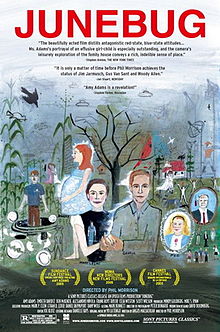Lynn Lee revisiting Junebug, which celebrates its 10th anniversary this week…
 Junebug is best known as the film that launched Amy Adams’ into the A list, and deservedly so. Her wonderfully layered portrayal of the bright-eyed, meerkat-loving Ashley, should have taken home the supporting actress Oscar for 2005 (with apologies to Rachel Weisz). But for a change let's talk about the best scene in the movie, in which another, more elusive character suddenly, if fleetingly, comes into focus.
Junebug is best known as the film that launched Amy Adams’ into the A list, and deservedly so. Her wonderfully layered portrayal of the bright-eyed, meerkat-loving Ashley, should have taken home the supporting actress Oscar for 2005 (with apologies to Rachel Weisz). But for a change let's talk about the best scene in the movie, in which another, more elusive character suddenly, if fleetingly, comes into focus.
I’m referring to the scene in which George (the always-welcome, perennially undervalued Alessandro Nivola), the returning native who’s brought his new wife Madeleine (Embeth Davidtz) to visit his small North Carolina hometown, attends a church social with his family. By this point, Madeleine’s outsider status has already been made starkly clear: a long-limbed, graceful, effortlessly stylish and posh-accented art dealer whom George met and married in the big city, she stands out without even trying, like a greyhound among border collies. George’s status, on the other hand, is more ambiguous.
The trip was Madeleine’s idea, not his, and he remains tight-lipped about the family and community he hasn't seen in years. Yet the church gathering leaves little doubt the town still considers him one of their own. While the congregation members are friendly towards Madeleine, George is welcomed warmly back like the favorite son he is. It doesn’t matter where he’s been or how long he’s been away; it doesn’t even matter how he consciously feels about being back. Something deep-wired – instinct, upbringing, perhaps some blend of the two – allows him to slip smoothly back into an old groove, and everyone except Madeleine knows it.
The point’s driven home when the pastor asks George to sing. George demurs at first, but before we know it he’s delivering a spellbinding a cappella rendition of “Softly and tenderly,” accompanied by two other men in the congregation. It’s spontaneous, earnest, and utterly lovely in its simplicity. It’s also remarkable for the range of reactions it draws from the other characters and how perfectly they crystallize George’s relationship with each of them. Johnny (Ben McKenzie), always in his older brother’s shadow, turns his back for almost the entire time and refuses to join the applause. Ashley reveals a rapt yet thoughtful, almost somber, demeanor, hinting at emotional depths we’ll discover later, before shifting to joyous approval at the close. George’s stonyfaced mother (Celia Weston) unbends briefly, poignantly mouthing along the lyrics (“come home, come home” indeed) before breaking into a smile of quiet pride at the end—a smile that says more eloquently than words, “That’s my boy.”
The most telling reaction, however, is Madeleine’s. She stares and stares at George like she’s never seen him before, and in a way she never has. The moment marks her first realization that there’s an integral part of this man, her husband, that she never even knew existed and may never truly understand. It also foreshadows the couple’s later rift over visiting Ashley in the hospital. For all the urbane veneer George acquired since leaving home, his old codes and values, so foreign to Madeleine, still lie deep at his core and can’t be denied as long as he’s with this family, in this town. Perhaps that’s why he was so reluctant to bring Madeleine there in the first place, and so apparently relieved to be leaving again by the end.
The rest of the film is more uneven than I remembered – I could have done without the subplot involving Madeleine’s quest to sign an eccentric local artist, and the script occasionally goes out of its way to emphasize her fish-out-of-water cluelessness. But this one scene is perfect. It’s a sweet interlude that also manages to sum up, in just a few minutes, all of the themes and dynamics that Junebug as a whole carefully explores at length. From both a musical and narrative standpoint, this hymn strikes just the right note.
